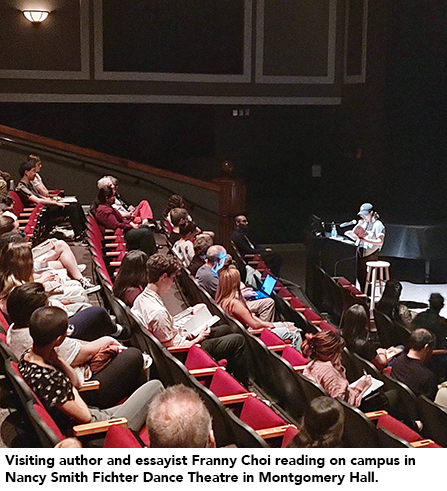English department creative writing graduate students collaborate to bring award-winning poet Franny Choi to FSU
By Isabelle Alegria
Poet and essayist Franny Choi recently visited Florida State University to read their poetry and participate in a Q&A panel. Choi’s striking poetry speaks to current political and social issues. Their poems question gender, race, sexuality, and technology, creating a space for readers to confront and ponder these topics.
Choi’s time on campus was insightful, and I was moved by the way they engaged with students. On the afternoon of April 9, the Williams Building Common Room  was filled with semi-circles of chairs, students crowded in, all looking to the front of the room where Choi sat with FSU English-Creative Writing doctoral candidate Landis Grenville. Choi smiled, encouraging student questions.
was filled with semi-circles of chairs, students crowded in, all looking to the front of the room where Choi sat with FSU English-Creative Writing doctoral candidate Landis Grenville. Choi smiled, encouraging student questions.
Within the first couple of questions, the exchanges clearly showed that Choi’s work is popular among college students. Questions arose concerning LGBTQ+ activity in the publishing world, themes of gender roles, and the role of technology in Choi’s writing. One student told Choi that they recently founded a book club with a circle of friends; the club had read two of Choi’s books and the writing inspired them.
Later in the evening, I attended Choi’s reading on campus in Nancy Smith Fichter Dance Theatre in Montgomery Hall. My favorite Choi poem, “The World Keeps Ending, and the World Goes On,” had a special pull on the audience seated in the hall. In this title poem from her 2022 collection, Choi questions the idea of an “apocalypse.” Typically thought of as “the apocalypse,” inferring one catastrophic event that is essentially the end of the world, Choi flips the term on its head, stating that the world has experienced several apocalypses.
In doing so, Choi changes the meaning of the word, exposes how certain groups of people are isolated from one another in their experience of the world, and how life continues even after the unthinkable. In changing the meaning of apocalypse, Choi transforms a message of fear and condemnation into one of strength and hope.
Choi's visit to FSU gave all young writers an exceptional example of a poet who has created a space to question and observe the world through poetry.... Their beautiful poems shed light on centuries of history and the suffering of multiple groups of people.
Certain lines name political apocalypses, such as, “There was the apocalypse of pipelines legislating their way through sacred water…,” which refers to the Dakota Access Pipeline and its effect on Standing Rock Sioux Tribe land. Another line confronts the history of slavery in America, “…the apocalypse of dogs and slave catchers whose faces glowed by lantern-light.” Choi addresses colonization with the line, “… the apocalypse began when Columbus praised god and lowered his anchor. It began when a continent was drawn into cutlets.”
The speaker takes an authoritative, yet gentle voice, saying, “I was born from an apocalypse and have come to tell you what I know--…” And in the poem’s ending, Choi brings hope to the audience: “It ended, and another ending world spun in its place. It ended, and we woke up and ordered Greek coffees….”
Choi is the author of multiple books, including The World Keeps Ending, and the World Goes On; Soft Science; Floating, Brilliant, Gone; and Death by Sex Machine. They are currently Faculty in Literature at Bennington College in Massachusetts.
The English department's Creative Writing Program, the Southeast Review, and FSU's Congress of Graduate Students brought Choi to campus. Their visit gave all young writers an exceptional example of a poet who has created a space to question and observe the world through poetry. Their interactions with students during the Q&A panel answered questions about the writing process, what inspires Choi’s poetry, and how they address multiple relevant themes in their work. Their beautiful poems shed light on centuries of history and the suffering of multiple groups of people.
Choi acknowledges suffering with gentleness and opens minds to consider the suffering of others. Choi is an incredibly talented poet and having met them in person was encouraging.
Isabelle Alegria is an English-Creative Writing major, with a minor in history. She graduates from FSU in early May.
Follow the English department on Instagram; on Facebook; and on X.
